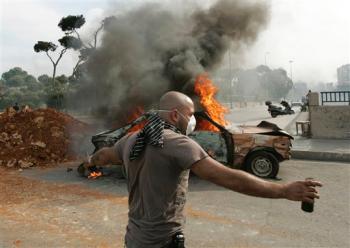
BEIRUT:The usually bustling streets of Beirut were almost deserted but tense on Wednesday as tire-burning protesters blocked roads for a general strike in which economic and political woes collided. Soldiers, many dressed in riot gear, were deployed in force throughout the Lebanese capital where protesters burned tires and overturned garbage bins in the streets barring traffic from passing through. The road to the airport was blocked impeding travellers from making their flights. Three army tanks and several army vehicles stood in between supporters of rival camps along the Corniche al-Mazraa thoroughfare, as groups of youths from the ruling bloc. Protesters from the Hezbollah and Amal, clashed with supporters of Lebanon's government. Wednesday as a strike paralyzed large parts of Beirut. Explosions and gunfire rang out across Lebanon's capital. The cause of the explosions was not immediately known and there was no word on casualties.The clashes began when government and opposition supporters in a Muslim sector of Beirut exchanged insults and began throwing stones at each other. Witnesses said security forces intervened. A cameraman for Hezbollah's al-Manar television was beaten by a soldier, the station reported. The state-run National News Agency reported that he was struck in the forehead during the clash. Bystanders wrapped a shirt on his head to stop the bleeding before he left on his motorcycle.
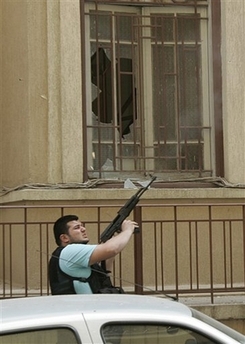 At least 10 people, including two soldiers, were injured on Wednesday after a General Labor Confederation (GLC) strike which was meant to protest the government's economic policies turned violent, leading to the blocking of roads and armed clashes in several parts of Beirut. One of the roads blocked by protesters was the main artery to the capital's international airport, causing dozens of flights to be delayed or cancelled. Three arrivals came in in the early afternoon, but a statement from the national carrier, Middle East Airlines, announced that all departures between midnight Wednesday and noon Thursday had been scrubbed. About 200 passengers were stranded at the airport by early evening, an aviation source told AFP. Some arriving travelers could be seen walking outside the airport, past burning tires and mounds of earth, as they tried to make their way home. Security sources told The Daily Star that in addition to the berms, opposition supporters have started setting up tents in the vicinity of the airport in a bid to stage an open sit-in similar to the one in place in Downtown Beirut since December 2006. The 10 people were injured during clashes between Hizbullah and Amal supporters and pro-government Future Movement supporters in the Beirut areas of Corniche al-Mazraa, Ras al-Nabeh, Wata al-Mosseitbeh, Cola, and others. The security sources also said that a Future Movement office in the Ras al-Nabeh neighborhood was hit by several rocket-propelled grenades. Three Future supporters were injured as a result of the attack. However, Hizbullah's Al-Manar television accused militants affiliated with the Future Movement of hiding in the office and opening fire on demonstrators, adding that army soldiers broke into the office and arrested the militants.
At least 10 people, including two soldiers, were injured on Wednesday after a General Labor Confederation (GLC) strike which was meant to protest the government's economic policies turned violent, leading to the blocking of roads and armed clashes in several parts of Beirut. One of the roads blocked by protesters was the main artery to the capital's international airport, causing dozens of flights to be delayed or cancelled. Three arrivals came in in the early afternoon, but a statement from the national carrier, Middle East Airlines, announced that all departures between midnight Wednesday and noon Thursday had been scrubbed. About 200 passengers were stranded at the airport by early evening, an aviation source told AFP. Some arriving travelers could be seen walking outside the airport, past burning tires and mounds of earth, as they tried to make their way home. Security sources told The Daily Star that in addition to the berms, opposition supporters have started setting up tents in the vicinity of the airport in a bid to stage an open sit-in similar to the one in place in Downtown Beirut since December 2006. The 10 people were injured during clashes between Hizbullah and Amal supporters and pro-government Future Movement supporters in the Beirut areas of Corniche al-Mazraa, Ras al-Nabeh, Wata al-Mosseitbeh, Cola, and others. The security sources also said that a Future Movement office in the Ras al-Nabeh neighborhood was hit by several rocket-propelled grenades. Three Future supporters were injured as a result of the attack. However, Hizbullah's Al-Manar television accused militants affiliated with the Future Movement of hiding in the office and opening fire on demonstrators, adding that army soldiers broke into the office and arrested the militants.
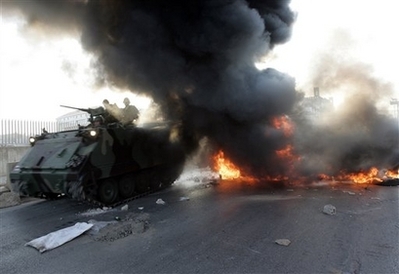 A soldier was hit in the mouth by a stone and two other news photographers also were hurt by stones, according to witnesses and television reports. Earlier in the same area, a stun grenade thrown into a crowd lightly injured three protesters and two soldiers, the state news agency reported. It was not immediately clear who threw the grenade. The clashes spread to several mixed Sunni-Shiite neighborhoods, with Sunnis backing the government and Shiites supporting the opposition. Armed civilians appeared on some streets.Troop reinforcements raced in armored carriers from one neighborhood to another to contain the disturbances. Around the city, protesters blocked roads with burning tires, dirt, old cars and garbage cans to protest against government economic policies and demand pay raises.
A soldier was hit in the mouth by a stone and two other news photographers also were hurt by stones, according to witnesses and television reports. Earlier in the same area, a stun grenade thrown into a crowd lightly injured three protesters and two soldiers, the state news agency reported. It was not immediately clear who threw the grenade. The clashes spread to several mixed Sunni-Shiite neighborhoods, with Sunnis backing the government and Shiites supporting the opposition. Armed civilians appeared on some streets.Troop reinforcements raced in armored carriers from one neighborhood to another to contain the disturbances. Around the city, protesters blocked roads with burning tires, dirt, old cars and garbage cans to protest against government economic policies and demand pay raises.
An opposition source said the protest campaign, including road blocks, would be extended until the government rescinded decisions taken on Tuesday affecting Hezbollah. A well-informed opposition source told The Daily Star on Thursday that the opposition would not stop its protest action unless the Western-backed government reversed its decisions. "Our movement will not stop and will change to become civil disobedience until our demands are met," the source added. "After rejecting Parliament Speaker Nabih Berri's call for dialogue, the government made a number of provocative decisions. Our movement is the result of these decisions." After an Amal Movement meeting that was headed by Berri later on Wednesday, the party held the Lebanese government responsible for the current escalation. Hizbullah's leader, Sayyed Hassan Nasrallah, is due to hold a new conference on Thursday to react to the government's recent decisions. Youth and Sports Minister Ahmad Fatfat told The Daily Star that the Lebanese Army and security forces would not hesitate to open the airport road in a timely manner. "Hizbullah's actions are an open attack against the state," he said. "What Hizbullah is doing reminds the Lebanese people of what Israel did to the airport in the summer 2006 war," he added, referring to the Jewish state's bombing of runways and fuel tanks. Meanwhile, Sunni Mufti Mohammad Rashid Qabbani lashed out at Hizbullah. "We thought that Hizbullah was dedicated to fighting Israel, but we were surprised to see Hizbullah change to an armed force that is trying to occupy Beirut," he said. "Hizbullah is kidnapping the airport to blackmail the Lebanese government in a bid to force it to accept the setting up of cameras to monitor the airport and the establishment of a private phone network for Hizbullah." Qabbani also said that Lebanon's Sunni community was fed up with Hizbullah's actions. He also lashed out at Iran for its financing of what he called "Hizbullah's violations." Also on Wednesday, Lebanese Forces leader Samir Geagea accused Hizbullah of being a "Mehdi Army" in the streets on Beirut, referring to Iraqi Shiite cleric Muqtada al-Sadr's militia, which has recently come under heavy attack by US and Iraqi forces. He also accused Hizbullah of wanting to control the airport. "Hizbullah is telling the Lebanese government: 'If the airport is not under our control, there will be no airport at all," he said. Geagea also said after meeting Prime Minister Fouad Siniora later on Wednesday that the Lebanese government was capable of unblocking the roads leading to the airport. "They think that we cannot reopen the roads. I assure them that we are capable of doing that," he said. In an interview with Future Television, Siniora said Hizbullah's actions were "worse than what Israel did during the 1982 invasion" because the resistance is not a foreign force.
For more pictures of these events please click read more
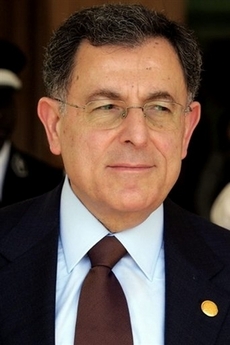 RTTNews) - Lebanon's government said on Tuesday that it would close down the telecommunications network used by Hezbollah for military purposes, as it was illegal and a danger to state security.Hezbollah argues that the telecommunication network is an integral part of its armory to fight Israelis. It says that the telecom network was used extensively in the group's war against Israel in 2006, which lasted over 3 months. Though Hezbollah maintains that its arsenal will only be used to defend against Israeli attacks, the Lebanese government sees the group's paramilitary capacity as a threat to its own authority and has consistently called on the Hezbollah to disarm.
RTTNews) - Lebanon's government said on Tuesday that it would close down the telecommunications network used by Hezbollah for military purposes, as it was illegal and a danger to state security.Hezbollah argues that the telecommunication network is an integral part of its armory to fight Israelis. It says that the telecom network was used extensively in the group's war against Israel in 2006, which lasted over 3 months. Though Hezbollah maintains that its arsenal will only be used to defend against Israeli attacks, the Lebanese government sees the group's paramilitary capacity as a threat to its own authority and has consistently called on the Hezbollah to disarm.
At the end of a marathon 11 hour cabinet session, Lebanese Information Minister Ghazi Aridi also announced on Tuesday that Brig Gen Wafiq Shuqeir, who was removed earlier for sympathizing with Hezbollah, would rejoin the army. Brig Gen Wafiq Shuqeir was earlier removed from the post of the commander of security at Beirut international airport for failing to detect spy cameras set up at the airport, allegedly by the Hezbollah, to monitor the movement of anti-Syrian Lebanese politicians and foreign dignitaries. Top Shiite cleric, Sheik Abdul-Amir Kabalan, had dismissed allegations of Shoukair
BEIRUT (AFP) – A leading member of Lebanon’s Western-backed ruling coalition called on Saturday for a ban on flights from Iran to …
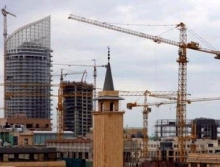 BEIRUT, May 2 - Profits at Lebanon's largest company Solidere for this year should remain near 2007 levels of $22 million, although political instability remains a threat, the company's general manager said on Friday.The profits are likely to match last year's levels. The political situation remains tense but no ongoing project in central Beirut has been cancelled," Mounir Doueidi told the Arab Economic Forum, a business gathering, in the Lebanese capital.
BEIRUT, May 2 - Profits at Lebanon's largest company Solidere for this year should remain near 2007 levels of $22 million, although political instability remains a threat, the company's general manager said on Friday.The profits are likely to match last year's levels. The political situation remains tense but no ongoing project in central Beirut has been cancelled," Mounir Doueidi told the Arab Economic Forum, a business gathering, in the Lebanese capital.
The real estate company , which owns most of the property in downtown Beirut, reflects the state of the Lebanese economy, which is officially forecast to grow at 4 percent this year, similar to 2007.Doueidi said the Souks shopping mall, a high-profile 100,000 sq metre project in the city centre being built by Solidere, will be completed in 2009. Solidere's assets are worth some $8 billion, with 50 projects being developed by private investors who had bought land from Solidere, he added.
"This is a conservative valuation which will rise if the political situation improves," said Doueidi, referring to a protracted power struggle between the pro-American government and the Hezbollah-led opposition. Iran and Syria back the Shi'ite movement. Former premier Rafik al-Hariri founded Solidere in 1994 to rebuild downtown Beirut after the 1975-1990 civil war and gave it a monopoly over most of the 1.8 sq km (20 million square feet) that form the centre.
Khazen History


Historical Feature:
Churches and Monasteries of the Khazen family

St. Anthony of Padua Church in Ballouneh
Mar Abda Church in Bakaatit Kanaan
Saint Michael Church in Bkaatouta
Saint Therese Church in Qolayaat
Saint Simeon Stylites (مار سمعان العامودي) Church In Ajaltoun
Virgin Mary Church (سيدة المعونات) in Sheilé
Assumption of Mary Church in Ballouneh
1 - The sword of the Maronite Prince
2 - LES KHAZEN CONSULS DE FRANCE
3 - LES MARONITES & LES KHAZEN
4 - LES MAAN & LES KHAZEN
5 - ORIGINE DE LA FAMILLE
Population Movements to Keserwan - The Khazens and The Maans
ما جاء عن الثورة في المقاطعة الكسروانية
ثورة أهالي كسروان على المشايخ الخوازنة وأسبابها
Origins of the "Prince of Maronite" Title
Growing diversity: the Khazin sheiks and the clergy in the first decades of the 18th century
Historical Members:
Barbar Beik El Khazen [English]
Patriach Toubia Kaiss El Khazen(Biography & Life Part1 Part2) (Arabic)
Patriach Youssef Dargham El Khazen (Cont'd)
Cheikh Bishara Jafal El Khazen
Patriarch Youssef Raji El Khazen
The Martyrs Cheikh Philippe & Cheikh Farid El Khazen
Cheikh Nawfal El Khazen (Consul De France)
Cheikh Hossun El Khazen (Consul De France)
Cheikh Abou-Nawfal El Khazen (Consul De France)
Cheikh Francis Abee Nader & his son Yousef
Cheikh Abou-Kanso El Khazen (Consul De France)
Cheikh Abou Nader El Khazen
Cheikh Chafic El Khazen
Cheikh Keserwan El Khazen
Cheikh Serhal El Khazen [English]
Cheikh Rafiq El Khazen [English]
Cheikh Hanna El Khazen
Cheikha Arzi El Khazen
Marie El Khazen